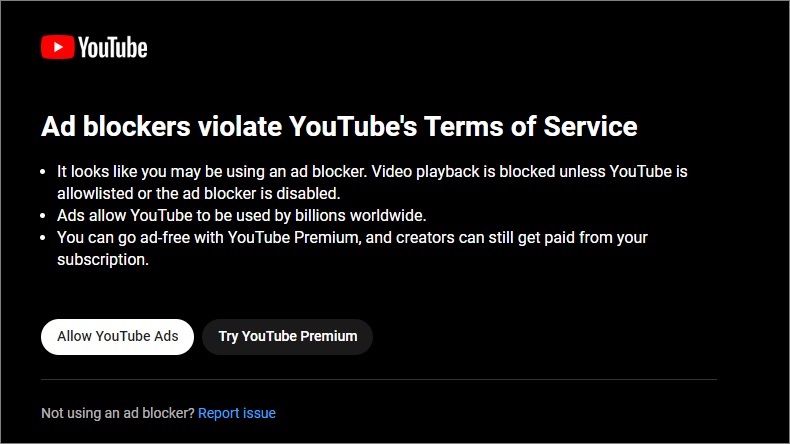YouTube is making it more difficult to block ads with the Alphabet-owned entity warning that it has “launched a global effort” to get users off ad blockers and onto its ad-free subscription service YouTube Premium which is also becoming more expensive.
Earlier this year, YouTube began prompting users to disable ad blockers or allowlist the video sharing site lest their access be throttled.
Last week, the company confirmed to multiple US outlets that it had begun a “global effort” to make blocking ads more difficult.
“The use of ad blockers violate YouTube's Terms of Service,” the company said. “Ads support a diverse ecosystem of creators globally and allow billions to access their favourite content on YouTube.”
Importantly for Alphabet – which makes 80 per cent of its money from advertising – YouTube ads are a big revenue driver, bringing in US$7.7 billion in the second quarter of this calendar year alone.
Now it’s giving people three choices: don’t watch YouTube, put up with ads, or fork out for Premium.
While expanding the roll out of its ad blocker blocking system, YouTube upped the cost of Premium by $2 per month for individual access (from $14.99 to $16.99). Family plans have also gone up in price to $32.99 per month for five people in the same household.
Ad blocking has primarily been a concern for in-browser YouTube watchers on mobile and desktop who install third-party extensions dedicated to blocking invasive the invasive tracking tools and surveillance software that is deeply embedded within ad-tech.
Information Age is still finding success with using the open source uBlock Origin extension on Chrome, Edge, and Firefox though your mileage may vary.

YouTube is aggressively trying to stop ad blockers. Image: YouTube
As much as it invokes caution due to the myriad fakes and malware masquerading as ad blocking software, the world of ad blocking speaks to the open-source ethos, featuring a community of volunteers who create and discover ways of circumventing big tech.
Often this is done in public forums like subreddits and GitHub repositories where people maintain code and update open-source filter lists to tell browsers extensions which domains to block, all with the intention of making the internet safer, less cluttered with ads, and more private while helping others choose what they want their devices to communicate with.
Raymond Hill, founder of uBlock Origin, describes ads in the software’s readme as being “just the visible portion of the privacy-invading means entering your browser when you visit most sites”.
But because ads are big business, blocking them has become a cat-and-mouse game that you can see happening in real-time as freemium products like AdGuard race to overcome YouTube’s latest attempt to claw money from its users.
As the YouTube ad blocker crackdown widens, people shop around to find a service that can stop them from needing to pay the monthly subscription fee or put up with ads.
Wired recently reported a spike in installs and uninstalls of ad blockers in the last month, most of which was driven by disappointed YouTube users who came up against a warning that their ad blocker was getting in the way of their content.
Has YouTube disabled your ad blocker? Let us know in the comments.










